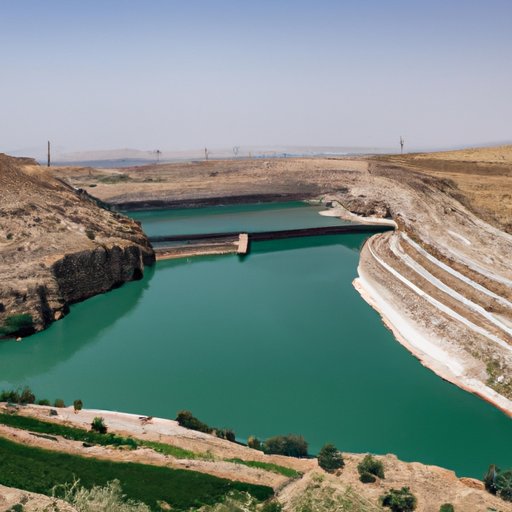Introduction
The Euphrates river has been an essential water source for human civilizations since ancient times. Spanning across Turkey, Syria, and Iraq, the river serves as a critical lifeline for millions of people, supporting agriculture, industries, and ecosystems. However, in recent years, the Euphrates has been drying up at an alarming rate, posing a severe threat to the livelihoods and well-being of the people and the environment. In this article, we will explore the impacts and causes of the Euphrates river drying up, examine its implications on local and international communities, and provide potential solutions to address this pressing issue.
Environmental, Economic, and Socio-political Impacts of the Drying Euphrates River
The drying up of the Euphrates river has serious consequences for the environment, economy, and socio-political situation in the region. One of the main environmental impacts is soil erosion and desertification. As the river dries up, the sediment and nutrients that keep the soil fertile are decreased, leading to increased erosion and the formation of deserts. This affects not only the local ecosystem but also the global climate, as desertification is a significant contributor to climate change.
Another critical impact of the Euphrates river’s drying up is the effect on the local economy and socio-political situation. The river provides water for irrigation, hydroelectric power generation, and transportation, all of which are vital for the region’s economy. The loss of these resources can hinder economic growth and lead to poverty and migration. Additionally, the scarcity of water resources can trigger socio-political conflicts between different groups, leading to instability and violence.
Causes and Factors Contributing to the Drying Up of the Euphrates River
The Euphrates river’s drying up is caused by a complex interplay of natural and human factors. One of the primary human activities contributing to the issue is damming. The construction of dams along the river for irrigation and hydropower generation purposes slows down the flow of water, causing the river’s water levels to decrease. Another significant human factor is climate change, which alters precipitation patterns and increases aridity, leading to droughts and water scarcity.
To address the issue, potential solutions include reducing water consumption and improving irrigation efficiency, implementing sustainable land use practices, and reforestation. Moreover, there are calls for the construction of more dams or hydropower plants to be halted, particularly those without proper environmental impact assessments, and to consider alternative sources of energy such as solar and wind power.
Impact of Euphrates River Drying Up on Local Communities, Agriculture, and Biodiversity
The drying up of the Euphrates river has substantial consequences for the local communities, agriculture, and biodiversity in the region. As the river’s water levels decrease, farmers face challenges in growing crops, leading to lower yields and decreased incomes. The lack of water also affects livestock, leading to fewer available feeds and reduced productivity. Moreover, the loss of water resources leads to wildlife and ecosystem loss, endangering the region’s biodiversity.
International Implications and Consequences of the Euphrates River Drying Up
The drying up of the Euphrates river has international implications and consequences. One of the main implications is regional instability, as water scarcity can trigger conflicts between countries. The situation is further exacerbated by existing tensions and conflicts in the region, such as the ongoing Syrian conflict and the long-standing dispute over water rights between Turkey, Syria, and Iraq. Moreover, the impact on neighboring countries and international relations may have far-reaching consequences, such as migration, economic downturns, and political upheaval.
Management Strategies and Policies to Help Prevent the Euphrates River from Drying Up
To address the issue of the Euphrates river drying up, various management strategies and policies must be implemented. These include sustainable land use practices and reforestation to prevent soil erosion and desertification, reducing water consumption and improving irrigation efficiency, and developing alternative sources of energy. Additionally, governments must halt the construction of dams or hydropower plants without proper environmental impact assessments. Cooperation between countries sharing the Euphrates river, such as Turkey, Syria, and Iraq, is also crucial to ensure sustainable water management and avoid conflicts.
Conclusion
The drying up of the Euphrates river poses a severe threat to the environment, economy, and people’s well-being in the region. Without urgent action, the situation will only worsen, leading to further conflict, instability, and environmental degradation. To prevent this from happening, we must acknowledge the impacts and causes of the issue, implement sustainable management strategies, and foster international cooperation. As individuals, we can do our part in reducing water consumption and supporting sustainable practices. Together, we can help preserve the Euphrates river for future generations.
